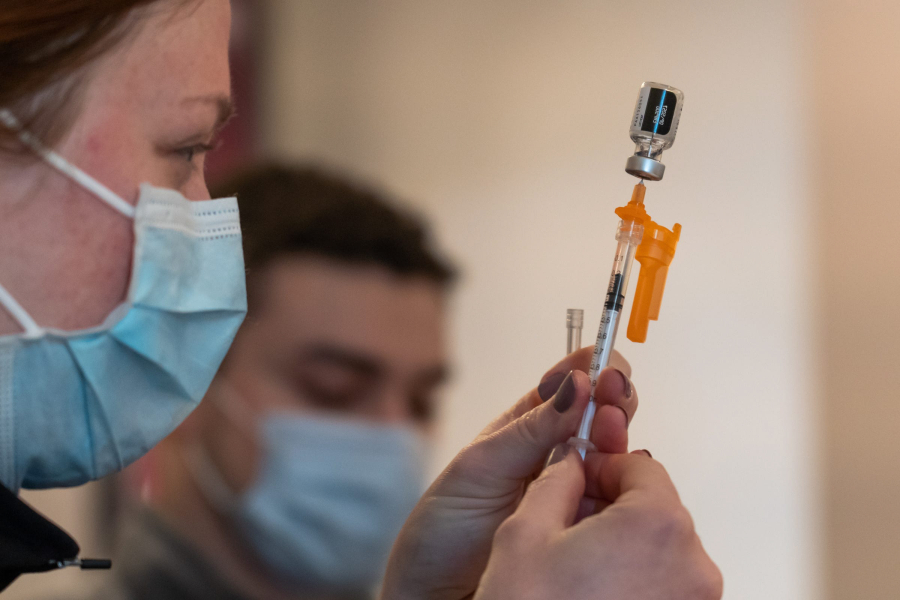Soon after the Pfizer and Moderna COVID-19 vaccines came to market, doctors began to notice something different in the mammogram images of a small fraction of women who’d recently gotten their shots: enlarged lymph nodes.
Swollen lymph nodes under one arm can be a rare sign of breast cancer, and when doctors find that, they usually order more testing, and potentially a biopsy to rule out cancer, said Dr. Kimberly Garver, the director of breast imaging at the University of Michigan.
However, in these women, the lymph node swelling was a normal immune response to the vaccines, and wasn’t actually cancer.
It led the Society of Breast Imaging to issue a recommendation that women should consider scheduling their mammograms four to six weeks after the second dose of a COVID-19 vaccine to avoid abnormal mammogram screenings and unnecessary tests.
Garver spoke to the Free Press, answering questions about what causes this to happen, and what the discovery means for the millions of women in America who are getting COVID-19 vaccines.
How often is this happening, and specifically what have you seen at the University of Michigan?
“About the same time we got a notice from the Society of Breast Imaging that this was being seen across the country, we saw a few cases, just a handful of cases, where we did see enlarged lymph nodes on the same side as where they got their vaccine,” Garver said.
“We’re not seeing as many cases as we thought we might. There have been no official studies, to my knowledge, published yet on the data. But anecdotally, we’re not seeing as many cases as we were concerned there might be. It’s probably on the order of a small, very small, percentage.”
“If we see swollen lymph nodes on the mammogram, most of the time it’s the body reacting to an infection or some sort of inflammation like arthritis that the patient may have,” Garver said.
Sometimes, it can also be a response to a vaccine, she explained.
“When any foreign substance enters your body, it’s the lymph nodes’ job to kind of protect the body,” Garver said. “And they swell and react in response to any foreign substance.
“When this happens, it’s telling us that the lymph nodes are doing their job and they are reacting to something foreign. And in the case of any vaccine, they are mounting an immune response, which is completely normal and what they should be doing. So, it’s a normal and healthy response.
“In a tiny percentage of cases, (swollen lymph nodes) could be an indication of cancer in the breast or cancer elsewhere in the body, such as lymphoma.”
“Yes. When we see swollen lymph nodes, it could be a sign of cancer,” Garver said. “So we’ll bring the patient back, and we’ll get more history to find out what’s going on.
“We’ll look for additional findings in the breasts that could be a sign of breast cancer. And if we see anything suspicious, we will biopsy the finding in the breast and or the lymph nodes.”
But for women who’ve gotten COVID-19 vaccines recently, the Society of Breast Imaging recommends doctors wait before performing biopsies.
“They said, ‘Hold off on doing those additional biopsies. Get additional imaging, but hold off on biopsying patients because this could be a vaccine reaction,’ “ Garver said.
“If we do see swollen lymph nodes and you’ve had a vaccine, we will call you back. We will do an additional ultrasound, and then we’ll follow you with ultrasound in three months to make sure that the lymph nodes returned to normal. So the worst case scenario is that we would do an additional ultrasound and then another ultrasound in three months to make sure things resolve.”
How long should women wait after getting a vaccine to have a mammogram?
“Ideally, at least four weeks,” Garver said. “But it’s probably better to wait six weeks.
“Now, this is only for a screening mammogram. If you have a breast problem, if you feel a lump, if you feel something new in your breast, if you’re called back for additional imaging after a screening mammogram, we do not want patients to delay in those cases.”
When that happens, Garver said, women should tell the technologist who performs the mammogram about their vaccine history and talk to their doctor about it.
COVID-19 vaccines are still relatively scarce right now. Let’s say you happen to get a vaccine appointment but you’ve got a mammogram already scheduled within four to six weeks afterward. Should you skip the vaccine? Skip the mammogram?
“I would get the vaccine,” Garver said. “And if you don’t want to reschedule your screening mammogram, come in for it. But we just want people to be aware that this is a potential source of confusion.
“Overall, I would tend not to delay my vaccine or my screening mammogram because we also need to find cancer, and that’s the job of the mammogram. So it’s a balancing act.
“If you can easily reschedule your mammogram for six weeks after your vaccine, great. But if you can’t, I would just get it and not worry about it.



